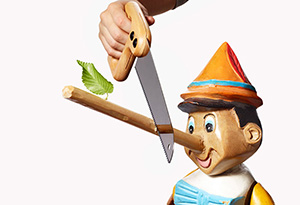Still haunted by a fib she told 13 years ago, Sarah Jio explores why even the smallest deceptions can strip away our sense of integrity.

Photo: Adam Voorhes
It was a clear summer night in Seattle, and my husband and I had gone to see a concert at a local winery with a couple we were just getting to know. The four of us spread out a picnic blanket, unpacked an assortment of gourmet snacks, and poured wine. Just before the band came on, a dozen hot-air balloons drifted overhead, stunning against the fiery sunset. We oohed and aahed. As our husbands looked on, my new friend turned to me and said, "I've always wanted to go up in a hot-air balloon. Have you ever done that?"
And then, out of my mouth, flew the lie. "Yes."
My cheeks flushed as she smiled in amazement and peppered me with questions. "What was it like? Was it fun? Did they serve Champagne?" I don't remember what I said. I was too stunned by my own deception.
Let me be clear: I had never set foot in a hot-air balloon. Never sailed among the clouds or felt the wind in my hair 1,000 feet above the ground. As the lie smoldered in me that evening, I analyzed dozens of back-out strategies and explanations ("I meant to say that when I worked for a cruise line, I helped people book hot-air-balloon tours, but I never actually went up in one"). In the end, none seemed right. So I kept my mouth shut. I felt guilty and ashamed. The lie, as random as it was, suddenly had power over me.
Today, more than a decade later, it still does. It is the one niggling blemish on my otherwise spotless sense of integrity. What compelled me—the girl who, after taking her first sip of alcohol in high school, immediately confessed to her parents—to blurt out such a trivial untruth? Can I really consider myself an honest person if I could lie so easily about something so silly?
When I put these questions to psychologist Robert Feldman, PhD, dean of the College of Social and Behavioral Sciences at the University of Massachusetts, Amherst, he tells me, "You're a terrible person!"—then laughs. "You acted in a very human way," he says. "That probably wasn't the only lie you told that night. You might have said, 'I feel terrific' or 'You look great,' when your friend didn't look that great. Lying is a natural part of human interaction." Research suggests that by the age of 3, most children understand the short-term benefits of deception to avoid trouble; according to one study, adults estimate they tell roughly 13 lies a week. When I polled my friends about their most recent untruths, one admitted that she'd fibbed to an acquaintance about her plans to attend graduate school at Harvard (she'd been accepted but decided not to go), and another confessed that she'd inflated the total page views of her Web site when making small talk with a stranger in line at the bank.
These misrepresentations, like my own, are classic make-yourself-look-better lies. Feldman says they aren't technically white lies—which are told to spare someone else's feelings; instead, they're what he refers to as social lies. "New acquaintances know nothing about us, so it's much easier to present ourselves in ways that make us more appealing or likable, since the chances of getting caught are low," explains Feldman, who points to a study he led in which he found that during ten-minute conversations with strangers, 60 percent of people lied, on average, two to three times. While the majority of the falsehoods were minor (some agreed with the other person's point of view even when they didn't actually share it, for example), others were bolder—one subject lied about being in a rock band, another trumped up her academic accomplishments.
Next: The most troubling thing she found out
And then, out of my mouth, flew the lie. "Yes."
My cheeks flushed as she smiled in amazement and peppered me with questions. "What was it like? Was it fun? Did they serve Champagne?" I don't remember what I said. I was too stunned by my own deception.
Let me be clear: I had never set foot in a hot-air balloon. Never sailed among the clouds or felt the wind in my hair 1,000 feet above the ground. As the lie smoldered in me that evening, I analyzed dozens of back-out strategies and explanations ("I meant to say that when I worked for a cruise line, I helped people book hot-air-balloon tours, but I never actually went up in one"). In the end, none seemed right. So I kept my mouth shut. I felt guilty and ashamed. The lie, as random as it was, suddenly had power over me.
Today, more than a decade later, it still does. It is the one niggling blemish on my otherwise spotless sense of integrity. What compelled me—the girl who, after taking her first sip of alcohol in high school, immediately confessed to her parents—to blurt out such a trivial untruth? Can I really consider myself an honest person if I could lie so easily about something so silly?
When I put these questions to psychologist Robert Feldman, PhD, dean of the College of Social and Behavioral Sciences at the University of Massachusetts, Amherst, he tells me, "You're a terrible person!"—then laughs. "You acted in a very human way," he says. "That probably wasn't the only lie you told that night. You might have said, 'I feel terrific' or 'You look great,' when your friend didn't look that great. Lying is a natural part of human interaction." Research suggests that by the age of 3, most children understand the short-term benefits of deception to avoid trouble; according to one study, adults estimate they tell roughly 13 lies a week. When I polled my friends about their most recent untruths, one admitted that she'd fibbed to an acquaintance about her plans to attend graduate school at Harvard (she'd been accepted but decided not to go), and another confessed that she'd inflated the total page views of her Web site when making small talk with a stranger in line at the bank.
These misrepresentations, like my own, are classic make-yourself-look-better lies. Feldman says they aren't technically white lies—which are told to spare someone else's feelings; instead, they're what he refers to as social lies. "New acquaintances know nothing about us, so it's much easier to present ourselves in ways that make us more appealing or likable, since the chances of getting caught are low," explains Feldman, who points to a study he led in which he found that during ten-minute conversations with strangers, 60 percent of people lied, on average, two to three times. While the majority of the falsehoods were minor (some agreed with the other person's point of view even when they didn't actually share it, for example), others were bolder—one subject lied about being in a rock band, another trumped up her academic accomplishments.
Next: The most troubling thing she found out

Photo: Adam Voorhes
Perhaps the most troubling finding of the study was that many of the subjects were unaware of how often they had lied until they watched videotapes of their conversations. "They were floored," Feldman says. That level of subconscious lying may be a harbinger of even bigger lies. When I asked Dan Ariely, PhD, professor of psychology and behavioral economics at Duke University and the author of The (Honest) Truth About Dishonesty, what separates harmless liars from the Lance Armstrongs of the world, he told me that ultimately it comes down to how people rationalize their dishonesty. Lies can wield the most power when we start to believe them. "In your case, you told the hot-air-balloon story purely out of vanity," Ariely says. "But imagine if you lied about being a Rhodes Scholar and then got a job based on that untruth. That's when things begin to escalate. What distinguishes the lies that tend to snowball out of control is due in large part to circumstance, not just the individual." But those circumstances are often predicated on a need to keep up the falsehood. Take, for example, the well-publicized case of former vice presidential candidate Paul Ryan, who claimed he ran a marathon in just under three hours, shaving more than an hour from his true time. By repeating the untruth over and over again, Ariely says, it may have become easier for Ryan to believe he was telling the truth.
At first I'm skeptical of this reasoning. If something never happened, how could anyone trick herself into believing it did? Ariely had an answer for this, too. In one of his experiments, people who cheated on a test were given certificates confirm-ing their dishonest scores. Over time the liars were more likely to believe that their exaggerated performance was an accurate reflection of their abilities. Getting confirmation, in this case in the form of certificates, can help make it easier to think of a lie as true. "Believing our lies is an incredibly important human capacity," Ariely says. "Without it, we risk living in terrible conflict all the time."
This helped explain why my guilt continued to gnaw at me so many years later. Unlike the testers, I had never taken part in the activity I lied about, nor was I ever in a situation to reinforce the falsehood.
While it was too late to come clean to my friend—we've since lost touch, and I'm sure she has long forgotten our conversation—I had to find a way to make peace with the lie. The simplest solution: finally taking a ride in a hot-air balloon. I found a local company on the Internet and was booked on a ride by the next weekend. Terrified of heights, I white-knuckled my way through the first agonizing minutes as the basket soared skyward. But somewhere over the emerald green hillside, I was overcome with a surprising sense of calm—the freeing feeling that comes when you've done the right thing. Now I had a true story to tell.
Sarah Jio is the author of four novels. Her most recent, The Last Camellia (Plume), was published in May.
More on Oprah.com
At first I'm skeptical of this reasoning. If something never happened, how could anyone trick herself into believing it did? Ariely had an answer for this, too. In one of his experiments, people who cheated on a test were given certificates confirm-ing their dishonest scores. Over time the liars were more likely to believe that their exaggerated performance was an accurate reflection of their abilities. Getting confirmation, in this case in the form of certificates, can help make it easier to think of a lie as true. "Believing our lies is an incredibly important human capacity," Ariely says. "Without it, we risk living in terrible conflict all the time."
This helped explain why my guilt continued to gnaw at me so many years later. Unlike the testers, I had never taken part in the activity I lied about, nor was I ever in a situation to reinforce the falsehood.
While it was too late to come clean to my friend—we've since lost touch, and I'm sure she has long forgotten our conversation—I had to find a way to make peace with the lie. The simplest solution: finally taking a ride in a hot-air balloon. I found a local company on the Internet and was booked on a ride by the next weekend. Terrified of heights, I white-knuckled my way through the first agonizing minutes as the basket soared skyward. But somewhere over the emerald green hillside, I was overcome with a surprising sense of calm—the freeing feeling that comes when you've done the right thing. Now I had a true story to tell.
Sarah Jio is the author of four novels. Her most recent, The Last Camellia (Plume), was published in May.
More on Oprah.com




